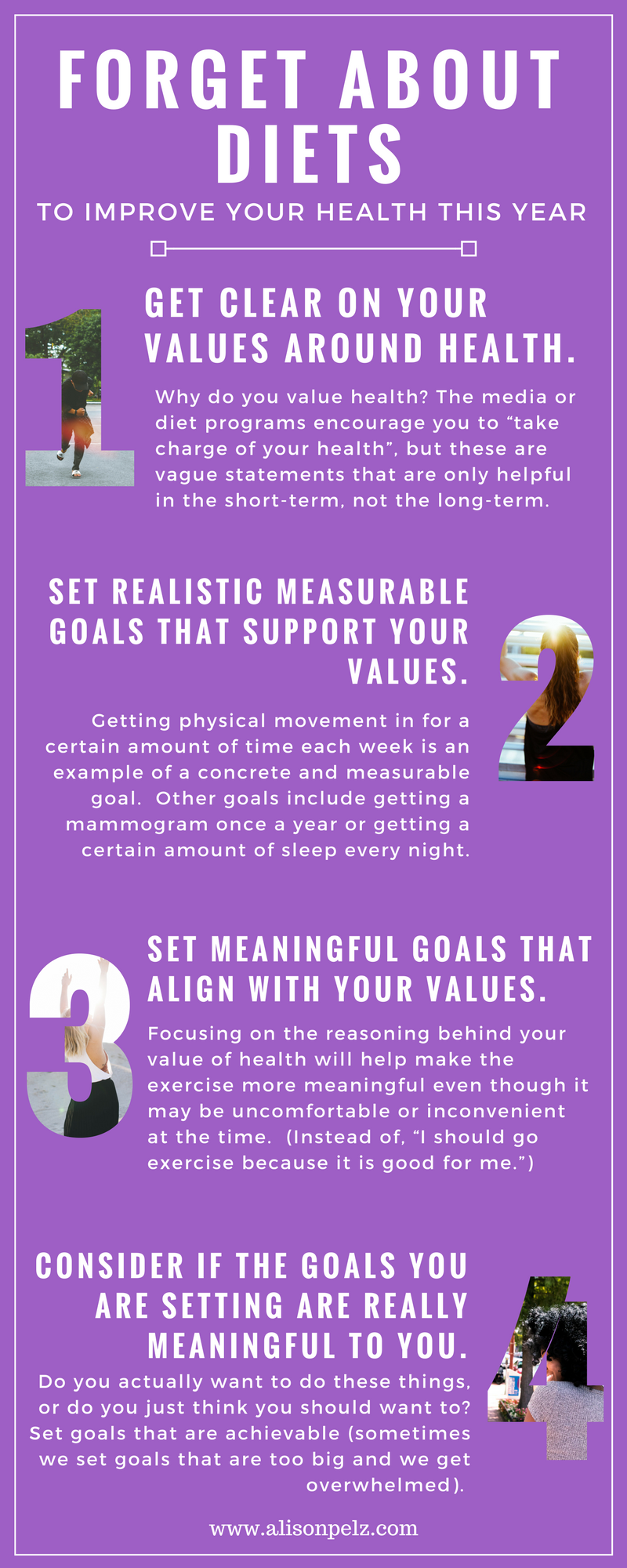It is that time of year: Everyone’s talking about their New Year’s Resolutions. Many headlines promote the “newest” diet trends to “jumpstart” weight loss in 2018. A 2014 study found that “stay fit and healthy” and “lose weight” were the top contenders as New Year’s Resolutions, at 32% and 37%, respectively.
In my blog post, 5 Reasons Not to Diet in 2017, I encourage readers to stop dieting in order to feel in more control of their eating and health.
So, maybe you are concerned about your health. Maybe you have diabetes or a family history of heart disease, or maybe you are noticing that it is harder to move in your body at its current fitness level.
Maybe you are so tired of dieting that you just can’t diet anymore (the diet is the problem, not you), or maybe you are recovered from an eating disorder and you know that dieting is a risk factor for relapsing.
Choosing not to diet for weight loss doesn’t mean ignoring your health.
Dieting sets-up this all or nothing thinking. You follow the diet, watching meticulously what you are eating to lose weight. Dieting usually is paired with an exercise routine. On the other hand, if you aren’t dieting, you may have developed a “screw it” attitude. You don’t pay attention to how you eat and you don’t exercise until you are on your next diet. (By the way, this is no personal failing of your own- studies show that dieting doesn’t work long-term).
The third option is not often presented by the medical community or diet programs. This option is to eat nutritious foods, move your body in a way that feels good to you, get enough sleep, get medical screenings or check-ups as recommended, and so on in the spirit of health, not weight loss.
You may be thinking, “But don’t I need to lose weight to be healthy?”
No!
This answer never wins me any popularity contests. There is not great scientific evidence to show that having a larger body causes medical problems. I would argue that the disconnection from our bodies that dieting causes is what leads to health problems. Additionally, modern medical science has NOT come up with a non-surgical intervention or treatment for weight loss that works long-term (meaning the ability to keep the lost weight off).
There is good evidence that dieting can be a predictor of weight gain and problematic eating behaviors such as purging, binge eating, or other types of eating disorders. Additionally, it is natural for folks to stop exercising if it isn’t producing weight loss, despite the cardiovascular, muscular and mental health benefits of exercise.
There is evidence that health-promoting behaviors (weight is not a behavior) do improve our health.
Health as a Value
If you are reading this, I am guessing that one of your values is health. What is a value? A value is what you judge to be important in life. Examples of values include family, being financially independent, or acting in an ethical manner. Values can help us guide our behaviors. Honesty is a value that most of us share, so we do our best to not lie, steal, or cheat.
Oftentimes goals are confused with values. A goal is something achievable such as running a marathon or having a fancy car. With values, there is no completion date, and they can’t be crossed off our to-do-list.
When you put on your seatbelt or wear sunscreen you are practicing a behavior that is guided by your value of health. Every time you put on your seatbelt you are reducing your risk of serious harm when you drive. Going to the doctor for physicals and screenings or going to the dentist is another behavior that supports the value of health.
You may be asking yourself, “Isn’t body weight a value?” Unlike wearing your seatbelt, weight is not a behavior or a value. It is a biomedical marker. Lowering your cholesterol is not a behavior. You do things like take medication, eat a heart-healthy food or exercise to try to reduce your cholesterol levels. Eating nutritious food and moving your body in a way that feels good to you are behaviors that support a value of health.
What to do:
- Get clear on your values around health.
Why do you value health? Maybe you love to travel and having good health allows you to do this. Maybe you want to have a long-life in order to see your children or grandchildren grow-up. The media or diet programs encourage you to “take charge of your health”, but these are vague statements that are only helpful in the short-term, not the long-term.
- Set realistic measurable goals that support your values.
Getting physical movement in for a certain amount of time each week is an example of a concrete and measurable goal. Other goals include getting a mammogram once a year or getting a certain amount of sleep every night.
- Set meaningful goals that align with your values.
Imagine that one of your values is traveling and you have a vacation coming up that requires a lot of walking. If you achieve a certain level of physical fitness you will be able to enjoy your vacation more. Focusing on the reasoning behind your value of health will help make the exercise more meaningful even though it may be uncomfortable or inconvenient at the time. (Instead of, “I should go exercise because it is good for me.”)
- If you notice that you aren’t achieving your goals, consider if the goals you are setting are really meaningful to you.
Do you actually want to do these things, or do you just think you should want to? Set goals that are achievable (sometimes we set goals that are too big and we get overwhelmed). Consider psychotherapy if you think you may have an eating disorder, depression, anxiety, or other mental illness.
Finally, check out these other resources to learn how to ditch dieting & make peace with food: Intuitive Eating and Health at Every Size.


